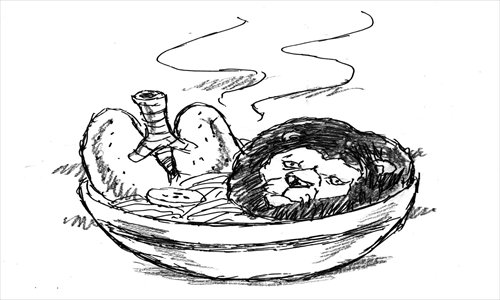Chinglish memorable, spreads culture

The thing that most impressed my friend during her first visit to Beijing was two dishes on the menu of a restaurant in Guijie, Dongcheng district, named "Husband and Wife Lung" and "Iron Black Pepper Cowboy Bone."
The cannibalistic names successfully killed our appetite. In the end, we only ordered a few cold vegetable dishes, and decided to donate the money we saved on our meal to charity.
My friend, an English teacher from Suzhou, had a curiosity about the city that made her notice details I missed. Every time I dine in a restaurant which has bilingual menu, I look through the Chinese names. It never crossed my mind that the neighboring English translation might scare away some customers.
Months ago, a colleague told me she once saw a dish called "50 Little Animals" on the menu of a restaurant in Shanghai. When the dish was served, she found they were 50 cicada's larva.
I thought that was outrageous until I visited Guijie with my friend. We noticed absurdly named dishes such as "Runescape Wild Cucumber" (a cold dish of cucumber), "Spicy Beauty Shoe" (pig's feet) and "Chongqing Kill Pig Food" (a Chongqing dish of braised pig blood and tripe). My friend burst into laughter.
Guijie, a well-known dining strip with some 100 restaurants lit by thousands of red lanterns, is close to the Russian Embassy and is frequented by many foreigners. I cannot imagine the reaction from foreigners who see "Iron Black Pepper Cowboy Bone" (beef bone) on the menu. Will they mock Beijing residents as having outdone Guangzhouers? In Guangzhou, locals eat every kind of crawling, walking or flying animal - but Beijingers seem to eat humans.
My friend took photos of the incredible translations. But as one working and living in the city, I felt awkward, and decided it is urgent for restaurants to stop creating opportunities for such stupid jokes.
According to media reports, Beijing begun to popularize the standard English translation of menus in fine hotels and restaurants in 2007, as a way to improve the service during the 2008 Beijing Olympic Games.
As a continuing effort, the Foreign Affairs Office of the People's Government of Beijing Municipality organized the compilation and publication of the book Enjoy Culinary Delights: A Chinese Menu in English as a reference guide.
Many odd translations were amended in the book. "Husband and Wife Lung" was changed into "Beef and Ox Tripe in Chili Sauce." "Red-Braised Lions' Heads" became "Stewed Pork Ball in Brown Sauce," and "Chicken Without Sex" became "Spring Chicken."
One year has passed since the publication of this book, but it seems like the suggestions won't be implemented for quite some time.
Many dishes' Chinese names are derived from an old story. For example, "Beef and Ox Tripe in Chili Sauce (Fuqi Feipian)" is named for a couple in Chengdu, who made the dish quite well and spread its reputation in 1930s. However, when a direct translation neither explains the history nor makes any sense, how can we ensure foreigners will not feel confused?
In my opinion, this is not a problem. If foreigners like a dish, they can discover the story behind its name through the Internet or Chinese friends. This will make it hard to forget the name of the dish, and they can order it the next time. After all, my friend will never forget the "Husband and Wife Lung," as long as she remembers her trip to Beijing.